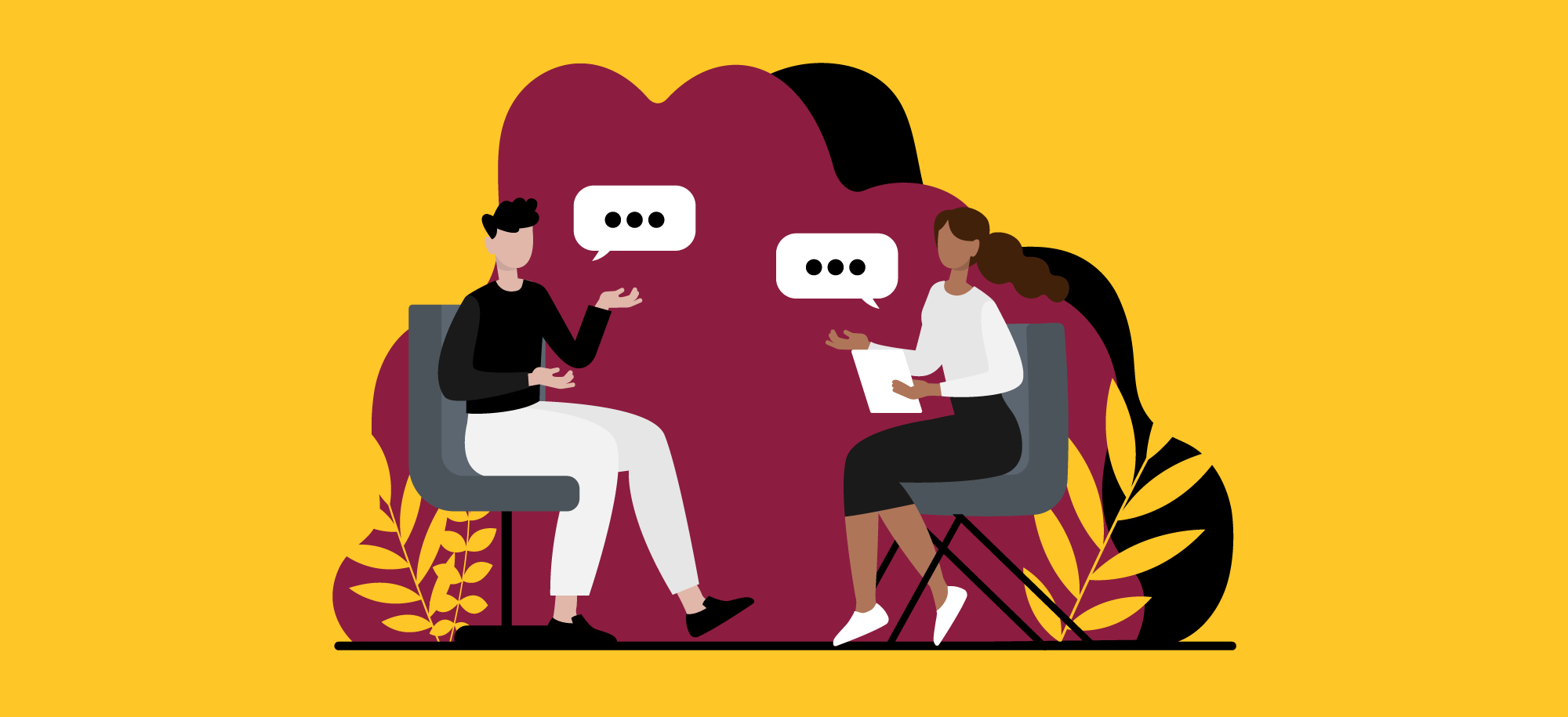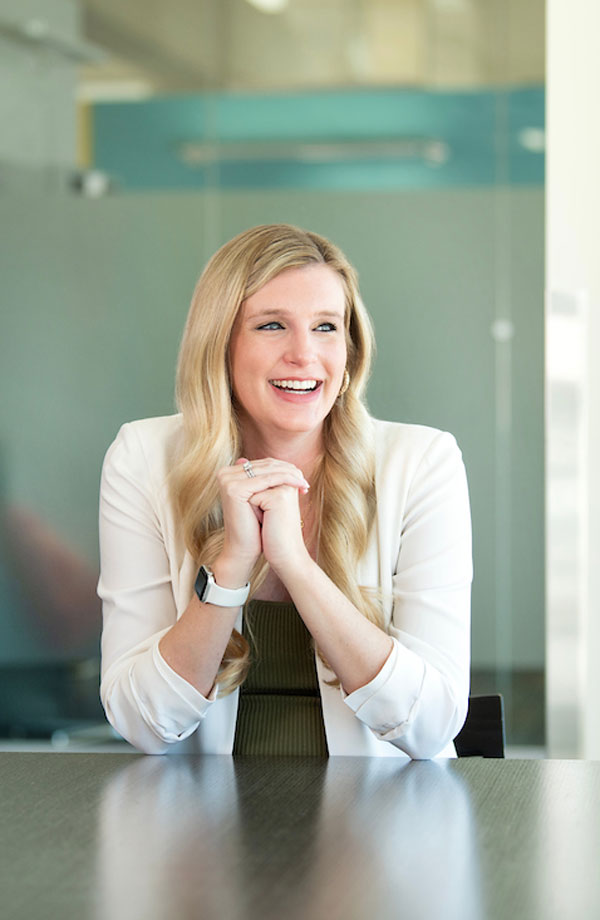
>> Executive Connections Stories
Gain the confidence to be successful: An interview with alum Megan Hucek

Megan Hucek
To better prepare students for a successful business career, the Full-time MBA at the W. P. Carey School of Business features the Executive Connections program, where students have the opportunity to collaborate with executive mentors sharing decades of valuable business experience.
For alumna Megan Hucek (Full-time MBA ‘20), conversations with Executive Connections mentors helped solidify her career goals and passions. Hucek went on to gain experience in brand management at Nestlé, before stepping into her current role as a Technology Manager at State Farm.
“When you have someone who's done this for so long and been so successful, it's a great resource to help you fully understand what path you might want to take,” she says.
W. P. Carey spoke with Hucek about what drew her to ASU, how the program helped her become a better leader, and her positive experiences with MBA classmates.
Q&A with Megan Hucek
What is it that makes Executive Connections so unique and impactful? Mentors, alumni, and current students know best. This conversation has been edited and condensed.
Question: Why did you decide to pursue your MBA at ASU?
Answer: I was looking for a place that would give me the resources and the ability to pivot my career. I came from the insurance industry, and I wanted to pivot into brand management and needed an avenue to do that.
When I thought about what I really wanted out of an MBA program, I was looking for diversity in my classes and in my peers. I also wanted a place where I felt like I belonged. I interviewed with a variety of different programs, and when it came down to it, I just felt like ASU was my fit. The people I met were very welcoming. I felt like I fit in here and thought that my perspectives and experience would be appreciated throughout my classes and interactions with peers.
That first impression matched my experience in the program. When it really came down to it, I think fit was most important. Of course, the Full-time MBA at ASU is a great program. I was able to accomplish everything I set out to do with the support from my professors, peers, Executive Connections mentors, and all of the resources available here.
Q: What did you gain from earning your MBA at W. P. Carey?
A: I would say one thing I gained was a much bigger network of awesome individuals. I'm very close with my class, and I still see and talk to a lot of people from the program. They're very important to me, and we spend a lot of time together, even now. The people are amazing.
Then, from a career perspective, I was able to make that full pivot into brand management and acquire a whole new set of skills. Even five years ago, that I would be pivoting my career wasn't even something that crossed my mind. It just opened so many more pathways for me and has given me a very open perspective on the trajectory of my career, my life, and the possibilities that have yet to come.
Q: How did Executive Connections enhance your leadership skills?
A: Executive Connections was a huge part of my journey, both at W. P. Carey and after I graduated. I've stayed connected with a lot of the mentors post-graduation. I would say it influenced my leadership abilities by providing different sounding boards, different perspectives. When I was having an issue with a project or with the group, there was always someone to bounce ideas off of and give me a different perspective that made it easier to find a resolution or move forward.
I was trying to make a huge pivot. I didn't have brand management or marketing experience; I was coming from the insurance industry. When I thought about what that looks like and how I needed to start positioning myself as a marketer and understand that landscape and what that would entail, I met with 4 to 6 different Executive Connections mentors throughout my first year alone.
I was trying to understand their experiences and what areas of marketing might be interesting to me. I also tapped into them as far as interviewing tips and what companies I should be pursuing. I think that gave me a leg up and allowed me to fine tune my resume, enhance my interviewing skills, and ultimately secure the internship I wanted.
Q: What was the best piece of advice you received from an Executive Connections mentor?
A: The best piece of leadership advice I received from an Executive Connections mentor would have been when I was early in my career at Nestlé. This was post-graduation, and I was on a new team. I worked remotely during the pandemic, so I wasn’t going to the office. I was making all my connections virtually, while trying to learn this new business. Yes, I had some experience, but, this was still very new to me.
I was trying to figure out how to work with an international team. I was working with folks from not only the United States, but also Mexico, Peru, Spain, and Switzerland, all in different time zones. How could I get us all on the same page, and make sure that we're all working toward the same goal and understanding the same timelines and everything that goes along with a cross-functional team?
I met with one of my Executive Connections mentors multiple times to find out what more can I be doing? He was able to offer advice based on his previous international brand experience on how to communicate better, how to make meetings more productive, how to make sure that it was a win-win for both the business team and the factory and operations side. So a lot of mentoring around how to make this very high-functioning team more effective and break down some of those barriers that innately exist when you're working remotely across multiple time zones, multiple cultures, and all of that.
Q: What advice would you give to a student considering the Full-time MBA program at W. P. Carey?
A: There's probably two pieces of advice. The most important one is come in with some kind of a plan. Know why you want to get your MBA. What do you want to get out of it? It doesn't have to be a full-blown plan. There are plenty of resources that can help you build out what that looks like, but have some kind of goal or objective in mind of what you want to accomplish. I would say that's the first piece of advice.
The second piece of advice is take advantage of getting to know your peers in the program. That's going to be your network moving forward. You're going to be tired, especially that first year. It's a tough first year. You're going to be tired. You're going to want to just go to bed. But if there's a happy hour or some other event, try your best to attend those, because it's a great way to not only meet people and learn about their different backgrounds and experiences, but also just unwind and fully embrace the whole experience. I know there were times where I was so, so tired and there was a group that might have been going out to grab a drink after a group project. I’d say, “Oh, should I go to bed? Should I go hang out?” I always chose to go hang out, and I think that was so important because that's where some of the best memories are made.